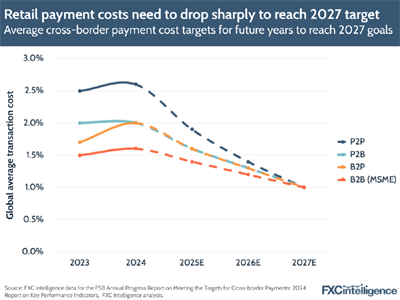
– To meet G20 targets to improve speed, cost, access and transparency by 2027, the consumer money transfer industry will need to reduce send costs by 27% each year.
– This is according to new FXC Intelligence analysis of the Financial Stability Board’s annual report on meeting the G20 targets set for 2027, which showed that performance has actually declined across most metrics between 2023 and 2024.
– The FSB has included extensive regional and market-type data in its reporting, much of which is directly provided by FXC Intelligence.
To meet G20 targets to target global average retail cross-border payments costs of no more than 1% by the end of 2027, the consumer money transfer industry will need to reduce send costs by 27% each year.
This is according to FXC Intelligence analysis of the Financial Stability Board’s (FSB) annual report on meeting targets set for 2027 released this week. The FSB’s reporting includes extensive regional and market-type data, much of which is provided by FXC Intelligence, the leading provider of cross-border payments data and intelligence. FXC Intelligence’s data is used directly for the retail payments section of the G20 benchmarking, one of three segments that make up the roadmap. It also indirectly supplies the remittances segment, as FXC Intelligence data underpins the World Bank’s Remittance Prices Worldwide dataset used for this section.
The retail section covers P2P payments (non-remittance consumer money transfers), as well as B2B, B2P and P2B payments. Overall, the FSB report showed that retail payments showed no marked improvement in 2024 compared to 2023, and moved away from the 2027 targets, with rising costs and reduced speeds across most metrics at a global average scale.
The global average costs to send $1,000 and $10,000 P2P saw percentage point increases of 0.07 and 0.1 respectively, to 2.6% and 1.9%.
FXC Intelligence analysis shows that to reach the G20 target, the global average cost to send a $1,000 consumer money transfer will need to reduce 27% each year from now until 2027, while the cost to send $10,000 will need to reduce by 19% each year. This is equivalent to a 0.7 percentage point reduction in 2025 for $1,000 and a 0.4 reduction for $10,000.
Lucy Inhgam, Editor-in-Chief and Head of Content at FXC Intelligence, said:
“It’s clear that the industry has a long way to go in order to meet the G20’s targets. While it may be easy to be discouraged by the limited progress over the past year, there is still significant potential to meet the G20’s goals over the coming years. With such a strong need to improve, particularly in some regions, there are clear opportunities for many providers of cross-border payments.
“The benefits of data to improve costs and speed in cross-border payments are clear, and FXC Intelligence is proud to contribute. We hope our insights continue to help benchmark progress and guide the industry toward achieving the G20 targets over the coming years.”
Read more about FXC Intelligence’s analysis of the FSB’s update in the report: ‘How did retail payments perform against the G20 cross-border roadmap targets in 2024?’.
Further information
● FXC Intelligence is the industry leader in cross-border payments data and intelligence. Our data is used by a number of international bodies, including the World Bank and the Financial Stability Board.
● The world’s biggest banks, payments and big tech companies use our critical data to make vital decisions that shape their day-to-day operations, product development and strategy.
● We track pricing, market size and product changes as they happen and update our dataset at high frequency, giving our clients the competitive edge they need to stay on top in a rapidly changing market.
● Our platform built on top of our data offers solutions such as price engines and sales enablement tools to drive our clients growth and profit.
● Our data gives us a unique understanding of cross-border payments, and we share our analysis and insights every week with subscribers to our newsletter, the most widely read in the cross-border payments market globally.
● Interested and want to find out more? Sign up to our newsletter here.





